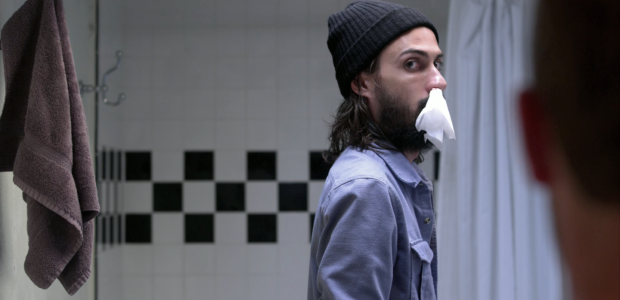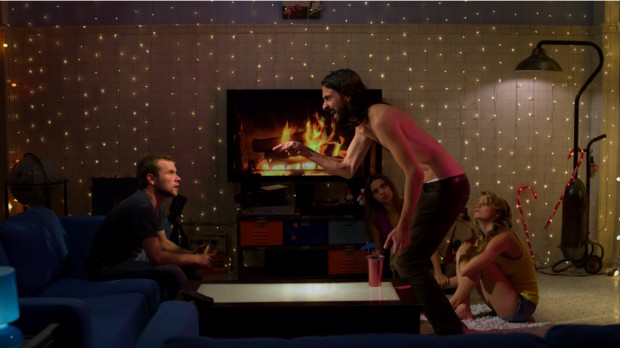American Animal exists within the crazed psyche of Matt D’Elia, which is appropriate because he’s the star, the writer, the director, the co-editor and also one of a handful of credited producers. His character is Jimmy, a crazed, maniacal twenty-something suffering from a potentially terminal illness that sends blood frothing from his nostrils at intermittent intervals. In a speedily-cut montage that opens the film, we witness Jimmy’s taking of a dozen or so prescription meds, each one separated by a swig of bottled water, and each one giving us further indication of the pent-up rage the day ahead of us is likely to unveil.

The film answers to no one other than Jimmy, though he’s joined in the one-location production by three friends. Principally, there’s Jimmy’s roommate and best friend, James (Brendan Fletcher, who seemingly hasn’t turned down a role since beginning his acting career in 1995), who, economically speaking, is a lot like his living companion – both are apparently extremely well-off thanks to parental earnings, and their stylish, modern-looking Los Angeles loft requires neither of them to maintain employment of any kind. Such a situation is expectedly tempting to a pair of attractive young women – playfully billed as Blonde Angela (Mircea Monroe) and Not Blonde Angela (Angela Sarafyan) – who take great pleasure in the act of being showered with free food, booze, and drugs.
There’s trouble in paradise, however, when the literary-inclined James is offered a paid internship at a top-notch publishing company – exactly the kind of societal contribution that Jimmy, as he tells us over and over again through numerous costumed diatribes, absolutely loathes. James knows this, of course, and attempts to keep the news from Jimmy for as long as possible, but it’s not exactly an easy task to hide a revelation like that when you have nobody else to tell except the people in the very room you’re in.

It’s quite clear – from things like the boisterously colored mise-en-scène to the intense, from-the-neck-up two-shot compositions — that D’Elia has chops behind the camera, but the film’s main claim to fame are the words of Jimmy, and the radical, addicting energy D’Elia brings to the role. Indeed, American Animal quite often comes off as a deranged sort of essay film. D’Elia’s rants, in a unique way, take the form of an enraged, impassioned student’s philosophical ramblings. That these long-winding speeches are also identifiably logical is an added bonus. Jimmy’s dialogues, regardless of how obscurely distracting the character’s wardrobe is at the time, are as surprisingly enlightening as they are simply dynamic.
A great many of viewers, I imagine, will take issue with a third-act-inducing incident that comes about an hour into the film. My major problem with it was that it strangely clouded what was, to my mind, a very agreeable and drolly respectable characterization up until that point. Still, though, I’d suggest not dwelling on it too much, not only because the film aggressively subverts the event’s oh-no-he-didn’t quality, but also because it makes way for D’Elia’s closing argument, which is worth every drop of fiery spit that shoots out of his mouth during the process.

Even more people, though, are probably prone to be turned off by the entire approach of the film, which is unusual and odd in the way it pieces together, quite erratically, arbitrary daily events into an oblique storyline. Take an early scene as an example: James is reading the newspaper, and Jimmy wants to know why. We get the point immediately — that these two best friends are very much opposites, one fully committed to gleeful, commitment-less isolation, the other harboring a desire to contribute and mesh with society as a whole — and yet D’Elia keeps the interaction going for minutes on end. It’s hardly necessary, from a narrative perspective, but I found myself entirely gripped by the boundary-free universe it sets up.
The real moment of discovery, however, is patiently held in tow until the very end, when a dead-tired Jimmy, leaning on his second-story balcony that holds a folded-over American flag, delivers a sermon about evolution. It was the effect of that line, creepy and cynical, that made me realize D’Elia’s film was something more than the presentation of a fresh, energetic voice. There’s a real, cutting methodical agenda here that, if you allow it, will creep under your skin like it did mine.
American Animal is now in limited release.

